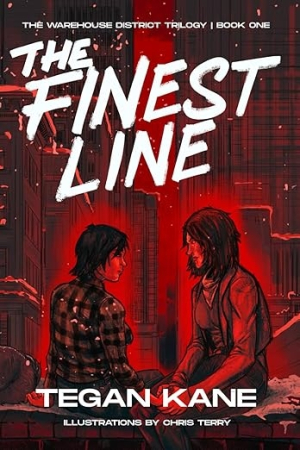
The Finest Line
The Warehouse District Trilogy Book 1
A closeted woman in a dystopian society chooses between honesty and artifice in the compelling future-set novel The Finest Line.
A woman comes to terms with her sexual orientation against a backdrop of rising religious and political tension in Tegan Kane’s dystopian novel The Finest Line.
Oakland has been keeping it together for the better part of twenty-eight years. She’s doing a commendable job considering she is the closeted daughter of a bishop of the Mormon Church. Then Christine walks into her veterinary clinic, tripping over herself and her dog, flirting hard, and upending Oakland’s structured life.
Struggling to reconcile her desire to explore what could be with Christine and her commitment to her family and her faith, Oakland is caught off guard when her father asks her to stand with him: the conservative state government has announced a plan for restoring traditional values. Heart in turmoil, Oakland must choose between artifice and honesty, even if it means leaving behind the only life she has ever known.
Set in 2051 and rife with social commentary, this near-future narrative includes contentious conservative politics and fundamentalist religious values whose unholy union produced an oppressive state. Here, religion and religious thought are cudgels, used to advance agendas that alienate rather than unite, all without representing sincere beliefs. This is most clear in the chapters featuring the council, as the governor and his advisors strategize about how to roll back progressive legislation and civil liberties. The governor’s wife is also introduced in these chapters; though she’s a calculated and cunning woman, her characterization is too based on what her husband thinks about her, and a clear sense of who she is emerges late in the book.
While Oakland’s and Christine’s characterizations are thorough, developed through their conversations, cute banter with one another, and interactions with their friends and family members, Christine assumes less narrative weight than Oakland. Oakland has work, faith, and the struggles of being closeted to contend with outside of her burgeoning relationship with Christine, while Christine’s internal conflicts seem dominated by Oakland. Indeed, Christine spends much of her time waiting for an indication that Oakland is ready to embrace their connection. It isn’t until late in the book that the encroaching conservative agenda moves closer to the forefront of her concerns.
Nonetheless, the story is propulsive. Its tension heightens, thrums, and releases, generated through a balanced combination of action, innuendo, and intimacy. Woven throughout the story of Oakland and Christine’s romance and the escalation of political enmity toward the queer community are secrets that people keep from each other, laying the groundwork for future relationships and increased clashes between the resistance and the government.
The Finest Line is a compelling dystopian novel in which the personal and the political are never far apart.
Reviewed by
Dontaná McPherson-Joseph
Disclosure: This article is not an endorsement, but a review. The publisher of this book provided free copies of the book and paid a small fee to have their book reviewed by a professional reviewer. Foreword Reviews and Clarion Reviews make no guarantee that the publisher will receive a positive review. Foreword Magazine, Inc. is disclosing this in accordance with the Federal Trade Commission’s 16 CFR, Part 255.
